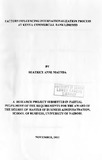| dc.description.abstract | ABSTRACT
Internationalization is the process of engaging in production of goods and services
beyond national boundaries. Firms may engage in such ventures either incrementally
starting with low commitment modes like exporting and licensing and then increase
gradually to the high commitment modes of Foreign Direct Investment (FDI); or they
may decide to start off with the high commitment modes of FDI directly without going
through the incremental stages.
On this basis, the study tried to analyze the reasons that prompt firms to engage in such
costly and risky ventures in foreign lands where they are at a disadvantage as compared
to the local firms. KCB was chosen as the appropriate firm to bring out this phenomenon
since it has used FDI through wholly owned subsidiaries as the only entry mode without
engaging in prior low commitment modes.
The OLI theory has been used by many to explain the existence of FDI. This study
adopted a case study approach to determine if the theory can explain KCBs preference of
wholly owned subsidiaries as the entry mode choice in all its foreign operations and thus
determine if the Ownership, Location and Internalization are the factors which influenced
the internationalization process at KCB.
The research found that the ownership advantages that KCB has includes, capital
strength, technological advancement and management skills. The common location
advantage that Tanzania, Sudan, Uganda and Rwanda have is the psychic distance
between the four countries and Kenya. This is beneficial because the cultures of the
people living in these countries are almost similar and they have traditionally been
vi
trading with each other. The bank in a bid to follow its customers who were trading in the
different countries was able to bring in new customers in these markets that it ventured
into. The main reason as to why KCB preferred to internalize its operations is the
technological platform which it uses to carry out all its processes whicg is able to provide
real time transactions across the national borders of all the countries in which the bank
operates.
The study also made a number of recommendations to the firm under study, policy
makers and brought up areas for further research. The governments of most of these
countries can improve the conditions for inward FDI to attract firms with financial power
such as KCB to consider their countries as suitable for setting up operations; this is
beneficial to the host country as a source of employment for its people. The
recommendation to the bank is that it should have a flexible policy to allow it to utilize
other forms of FDI such as acquisitions in more mature markets where there are suitable
candidates for acquisition. This will help the firm to penetrate the market faster and gain
market share within a short period of time rather than going through the slower route of a
greenfield venture in such mature markets. Further research can be carried out on firms in
a different sector e. g manufacturing to determine if the Ownership, Location and
Internalization are the factors that would make a firm to start foreign operations via FDI
instead of going through the incremental stages of internationalization from low
commitment modes of exporting to high commitment modes. | en |

